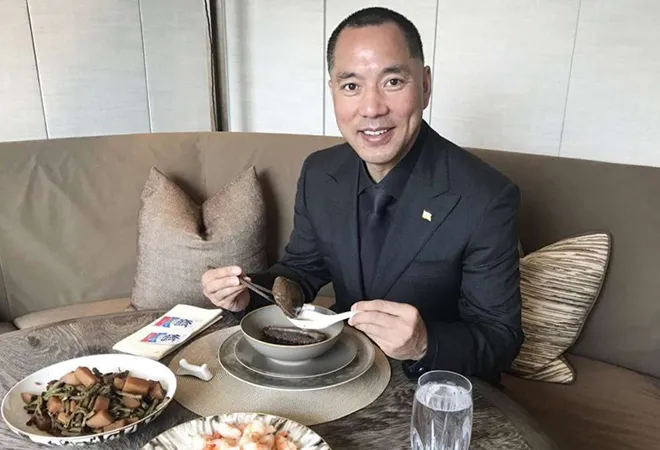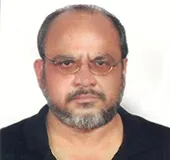
When
The New York Times (NYT) took the interview of Guo Wengui, a billionaire financial market tycoon, they must have known that this could be
the story that would influence the outcome of the 19th Communist Party of China (CPC) Congress. Guo told the NYT that years ago ‘a top police officer’ of China had told him that Xi Jinping, the all-powerful President of China, wanted him to dig up dirt on Wang Qishan.
Now, Wang for the uninitiated, is the ‘knee-capper’ of the Chinese President. In other words, he headed the Central Discipline Inspection Committee (CDIC) that took down the ‘tigers and flies’ or the big or small corrupt of the Party and the State. Since 2012, he has been a member of the Standing Committee of the Polit Bureau (SCPB), and is often called the ‘best premier China never had’. A super, subterranean power player of the nation, he has amassed enormous power ever since 150-plus vice premier-level officials and above, and about 200 hundred PLA senior brass have been caught for bribery.
Often, he is considered the second most important official of the CPC – right after the general secretary/president of the country.
His latest scalp is Sun Zhengcai, the Chongqing Party Secretary who was considered the premiership shoo-in, come 2022. Sun’s sorry state is being called the ‘curse of Chongqing,’ if you recall the high profile jailing of his ‘princeling’ predecessor, Bo Xilai. Bo’s father was Bo Yibo of the Chinese Revolution and a close associate of Mao Zhedong. Today, he remains incarcerated and his wife has a death sentence, along with the police chief of the province for conniving with Madam Bo in the murder of British businessman.
But that was merely the early move on the intricate
wei qi board of CPC’s internal politics, and Wang was an ally of Xi. But the Guo revelation about him – that Xi wanted Wang to be investigated – could now sour the relationship between the two at a particularly sensitive time. For, Xi reportedly has two sets of objectives to be achieved at the 19th Party Congress to be held in November next.
One, he reportedly wants the Party Congress to allow a change to the1982 amendment to the Chinese Constitution, by which Deng Xiaoping fixed the tenure of Party and State officials, who earlier tended to be gerontocrats. The change Xi seeks will allow him to continue in power for an indeterminate time.
Second, he would like to be free of any push-back by incumbent Party members by which those who wish to replace him become more powerful. The campaign against endemic corruption in the country was always meant to be ‘political’ in its primary motivation; and it was meant to instill fear in the minds of the corrupt, that if they stray ‘too much,’ they could end up in one ‘Laogai’ – China’s Gulag - or the other. If also, one recalls the Cultural Revolution as a giant-sized ‘controlled’ chaos initiated by Mao for establishing his absolute power over the Party structure, Xi version of CDIC driven anti-corruption campaign has the same motive force but with limitations. For example, as a ‘princeling’ himself, he could not have cut down the guanxi (cronyism)
system completely as his age-old network within the Party and specially, the PLA, could not have been dismantled considering the evolved system of the nation’s ‘socialism with Chinese characteristics.’ In other words, it would be counter-intuitive to believe that an authoritarian system can survive without a ‘patronage’ system.
More importantly, the fact that he could not cut down the Communist Youth League influence on the ‘pro-reform’ bureaucracy peopled by its former cadres, and specially their representative at the apex of power, Li Keqiang, have surely made him vulnerable.
In the ruthless exercise of power in the political structure of China, one misstep could lead to a long drop down the abyss, exemplified by the flamboyant Bo Xilai.
The other example is of Ma Jian, the intelligence Czar, ruling over the much feared ministry of state security. In his case, he had to make a ‘confession’ on video for taking a few million dollars from Guo, for mentoring him by opening crucial doors for him. The CDIC’s Wang himself is teetering at the edge. For, the cleavage between him and Xi has opened up a precarious pathway: for both it is danger ahead. If Xi could line up the ‘bull’s eye’ on Wang’s back, for some misdemeanor of omission or commission, he could then be given a golden parachute. That would entail him to fade into oblivion, having crossed the retirement age of 68 years.
Or it could be another scenario altogether. Wang, who has not shown great ambition to get either of the top jobs earlier, could decide that he would rather go down in flames unleashing a bloodbath – not uncommon in the CPC’s almost century-old history, since 1921. That would mean a war of dossiers and leaks emanating from Zhongnanhai.
It has become a Chinese tradition of sorts where the revelations about the inner working of the Party-State are usually sent out of China, mostly to the United States. This is a method tried and tested with the Tiananmen Papers and Guo Wengui’s interview being the latest.
The views expressed above belong to the author(s). ORF research and analyses now available on Telegram! Click here to access our curated content — blogs, longforms and interviews.



 When The New York Times (NYT) took the interview of Guo Wengui, a billionaire financial market tycoon, they must have known that this could be the story that would influence the outcome of the 19th Communist Party of China (CPC) Congress. Guo told the NYT that years ago ‘a top police officer’ of China had told him that Xi Jinping, the all-powerful President of China, wanted him to dig up dirt on Wang Qishan.
Now, Wang for the uninitiated, is the ‘knee-capper’ of the Chinese President. In other words, he headed the Central Discipline Inspection Committee (CDIC) that took down the ‘tigers and flies’ or the big or small corrupt of the Party and the State. Since 2012, he has been a member of the Standing Committee of the Polit Bureau (SCPB), and is often called the ‘best premier China never had’. A super, subterranean power player of the nation, he has amassed enormous power ever since 150-plus vice premier-level officials and above, and about 200 hundred PLA senior brass have been caught for bribery.
When The New York Times (NYT) took the interview of Guo Wengui, a billionaire financial market tycoon, they must have known that this could be the story that would influence the outcome of the 19th Communist Party of China (CPC) Congress. Guo told the NYT that years ago ‘a top police officer’ of China had told him that Xi Jinping, the all-powerful President of China, wanted him to dig up dirt on Wang Qishan.
Now, Wang for the uninitiated, is the ‘knee-capper’ of the Chinese President. In other words, he headed the Central Discipline Inspection Committee (CDIC) that took down the ‘tigers and flies’ or the big or small corrupt of the Party and the State. Since 2012, he has been a member of the Standing Committee of the Polit Bureau (SCPB), and is often called the ‘best premier China never had’. A super, subterranean power player of the nation, he has amassed enormous power ever since 150-plus vice premier-level officials and above, and about 200 hundred PLA senior brass have been caught for bribery.
 PREV
PREV


